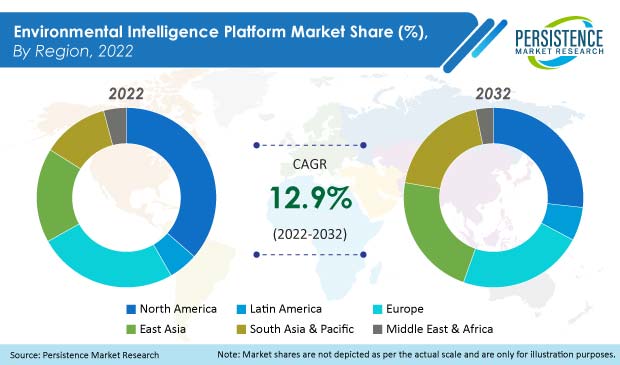Industry: IT and Telecommunication
Published Date: August-2022
Format: PPT*, PDF, EXCEL
Delivery Timelines: Contact Sales
Number of Pages: 350
Report ID: PMRREP32995
The global environmental intelligence platform market reached US$ 599.4 Mn at the end of 2021 and is expected to surge to a market size of US$ 2.26 Bn by 2032, expanding at a high-value CAGR of 12.9% over the next ten years.
Environmental intelligence platforms represented around 20% share of the global weather forecasting system market in the year 2021.
| Report Attribute | Details |
|---|---|
|
Environmental Intelligence Platform Market Size (2022) |
US$ 671.6 Mn |
|
Projected Market Value (2032) Value |
US$ 2.26 Bn |
|
CAGR (2022-2032) |
12.9% |
|
Top 5 Vendors’ Market Share |
Around 30% |
Environmental intelligence suites enable business leaders to better understand and manage environmental impact while preparing for critical weather and environmental conditions. Environmental intelligence cloud or AI-driven environmental intelligence software is used in many applications such as carbon footprint management, regulatory risk & compliance, sustainability management, and others.
Environmental intelligence platforms monitor for disruptive environmental conditions such as wildfires, severe weather, air quality, and flooding, and send alerts. Environmental intelligence services utilize climate risk analytics to foresee the potential effects of weather and climate change across industries and organizations.
The environmental intelligence platform market is estimated to rise at 12.9% CAGR between 2022 and 2032 in comparison with the 10.5% CAGR registered during 2017-2021. This is mainly due to the heightened need for the accuracy of long-range weather forecasting.
Persistence Market Research identifies that demand for sustainability management will surge at the highest CAGR of 15.8% during the forecast period owing to rising carbon emissions throughout the supply chain, which is playing a significant role in raising environmental awareness among industrialists.

“Big Data Transforming Field of Environmental Intelligence (EI)”
Big data is a digital age phenomenon. Over the last decade, information digitization has not only enabled the creation and storage of massive amounts of data but also their analysis in high-variety, high-volume, and high-velocity formats. This has greatly improved the quality of integrated environmental monitoring, both in terms of data and the techniques and tools that make Environmental Intelligence (EI) meaningful.
As a result, the use of environmental intelligence analysis and data has spread far beyond the public sector and is now incorporated into leading business intelligence practices.
“Sudden Climate Change Patterns Compelling Businesses to Adopt Business Intelligence Platforms”
Climate change is also shifting from being a distant concern to a top priority for both, government and business leaders. A recent example of this was President Barack Obama of the United States and President Xi Jinping of China's joint announcement on climate change. Climate change is also becoming more widely recognized in the business world as a factor that should be considered in long-term planning.
Whether the effects are direct (such as shifting and more extreme weather patterns) or indirect (such as regulations and social pressures), they are likely to have an impact on financial performance. In terms of direct effects, a substantial portion of global GDP is directly linked to climate-sensitive industry sectors and is vulnerable to future climate scenarios.
Thus, climate change is ultimately boosting the demand for business intelligence software across the world.
The North American regional market is estimated to expand 2.5X during the forecast period of 2022-2032.
Due to the presence of a large number of vendors and supportive governmental regulations, North America dominated the global market for weather forecasting services in 2021.
However, due to the large population and its importance as a hub for the transportation of goods around the world, the South Asia & Pacific market for environmental intelligence platforms is predicted to grow at the fastest rate over the decade.
Why is Adoption of Environmental Intelligence Solutions Surging in the U.S?
Demand for environmental intelligence solutions in the U.S. is expected to account for nearly 84.4% share of the North American market in 2022.
Companies must deal with the effects of climate change on their assets, supply chains, and business operations, as well as rising consumer and investor expectations for them to act as environmental leaders. Such developments in the country are expected to drive high demand for environmental intelligence solutions.
How Big is the Opportunity for Environmental Intelligence Platform Providers in China?
The East Asia region is predicted to remain the most attractive market during the forecast period. According to the study, the China environmental intelligence platform market is set to account for 46.3% market share in East Asia.
China has made significant improvements to its environmental laws and policies. The implementation and development of the 11th, 12th, and 13th Five-Year Plans have further clarified the goals of these regulations and laws. This has also helped increase public awareness and unify efforts across all fronts to reallocate resources and meet specific environmental targets.
China has accomplished the decoupling of NOx and SO2 emissions from economic growth earlier in development than OECD nations. The key concern for the next steps is how to continue with the green development. Such government initiatives toward a sustainable environment are set to drive the demand for environmental intelligence solutions in the country.
Why is the U.K. Witnessing High Demand for Environmental Intelligence Solutions?
According to this study, the market for environmental intelligence solutions in the U.K. is estimated to expand at a high CAGR of 21.3% during the forecast period.
Such development in the country is expected to drive the demand for environmental intelligence solutions in the U.K.
Will Demand for Environmental Intelligence Platforms Continue to Rise Rapidly?
The environmental intelligence platform segment is expected to showcase a higher market share over the coming years, at 63.6%.
Environmental intelligence platforms are used to monitor disruptive environmental conditions such as severe wildfires, weather, flooding, carbon emissions, and air quality, and send alerts. They predict the potential impacts of weather and climate change across various businesses with the help of climate risk analytics.
These platforms also prioritize mitigation and convert real-time insights into potential operational disruption and response efforts. Such advantages are driving the adoption of environmental intelligence platforms on a large scale.
Why is There Increased Need for Carbon Footprint Management?
The carbon footprint management segment is expected to progress at a high CAGR of 11.5% during 2022-2032.
Using AI and geospatial analytic models, an environmental intelligence platform aids organizations in monitoring and identifying carbon emission hotspots throughout their supply chain.
Carbon accounting APIs in the carbon performance engine use AI-driven natural language processing and augmentation to reliably and efficiently accelerate data transformation. Thus, the adoption of environmental intelligence platforms has increased carbon footprint management applications over the years.
What Will Drive Demand Growth for Environmental Intelligence Platforms in the Energy & Utilities Industry?
The energy & utilities industry is estimated to account for a market share of 22.5% in 2022.
Environmental intelligence can help assess equipment requirements for heavy power line loads during extremely hot or other severe weather conditions. Severe Weather Data Inventory (SWDI) generates critical information for the detection and evaluation of severe weather conditions, as well as preliminary and verified storm damage reports.
These and other environmental intelligence sources can assist the energy industry in preparing for the changes caused and exacerbated by climate change. As such, the energy & utility segment is expected to expand at a higher CAGR during the forecasted period.
Vendors of environmental intelligence platforms are focusing on expanding their regional and global product networks through the introduction of new products, acquisitions, and alliances with significant market participants.
| Attribute | Details |
|---|---|
|
Forecast Period |
2022-2032 |
|
Historical Data Available for |
2017-2021 |
|
Market Analysis |
USD Million for Value |
|
Key Regions Covered |
|
|
Key Countries Covered |
|
|
Key Market Segments Covered |
|
|
Key Companies Profiled |
|
|
Report Coverage |
|
|
Customization & Pricing |
Available upon Request |
Environmental Intelligence Platform Market by Solution:
Environmental Intelligence Platform Market by Application:
Environmental Intelligence Platform Market by Industry:
Environmental Intelligence Platform Market by Region:
To know more about delivery timeline for this report Contact Sales

The global environmental intelligence platform market was valued at US$ 599.4 Mn at the end of 2021.
Sales of environmental intelligence platforms are estimated to increase at a CAGR of 12.9% to reach US$ 2.26 Bn by 2032.
South Asia & Pacific is projected to register strong growth at a CAGR of 18.1% during the forecast period.
North America leads the global market with a share of 36.4%.
Rising demand for weather forecasting services as agriculture expands to meet the needs of a growing population, need to improve airline safety, and rainfall uncertainties and key drivers for market growth.
Environmental intelligence platforms are expected to dominate the market with 63.6% share by 2032.
From 2017 to 2021, demand for environmental intelligence platforms increased at 10.5% CAGR.
Top 5 countries driving most demand for environmental intelligence platforms are the U.S., Germany, China, U.K., and Japan.